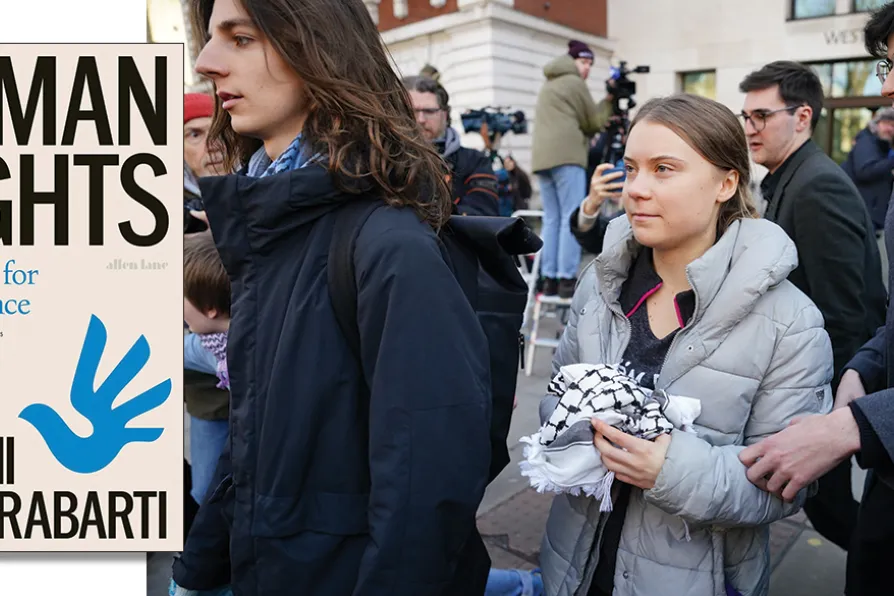JAN WOOLF applauds the necessarily subversive character of the Palestinian poster in Britain

 THIN END OF A WEDGE: Greta Thunberg and fellow protesters leave Westminster Magistrates' Court, London after being charged with a public order offence during a protest in central London last year, February 1 2024
THIN END OF A WEDGE: Greta Thunberg and fellow protesters leave Westminster Magistrates' Court, London after being charged with a public order offence during a protest in central London last year, February 1 2024
Human Rights: the Case for the Defence
Shami Chakrabarti
Allen Lane, £17.99
YOU can probably tell a lot about a book by who it is that various newspapers ask to review it. Friends get friendly reviews; enemies get critical reviews and dangerous authors are undermined by reviews that attack the writer rather assess the book’s content.
The Daily Telegraph asked Jonathan Sumption, a former Justice of the Supreme Court, to review this book. He does, as would be expected, have significant differences with Chakrabarti but the paper thought it was important enough to commission a serious critique.
The Times, however, invited a PhD candidate whose research is on “the notion of sovereignty within the context of international law.” His review, rather than addressing the issues, tries to undermine the author with ridiculous accusations. For example, he claims Chakrabarti is stating that: “‘rights nationalists’ are no better than wife beaters and child molesters.”
I have to declare that I am writing this review as an admirer of Chakrabarti’s work and writing over many years. I do think it is important to highlight the important issues raised in this book and encourage others to both read it and join in the discussions around it.
So, what is the dangerous idea that Chakrabarti is propounding in this book? She is making the case for international standards in human rights, and doing so at a time when the Tory government is using its last few months in power to undermine human rights and international treaties.
She points out that human rights as a concept is contested across the political spectrum. By going back to basics, she takes nothing for granted in making the case for the defence. She is careful to make a distinction between legislation that she disagrees with and legislation that clearly violates dignity and human rights.
We are probably aware of cynicism about human rights from the right-wing of politics. How often have we heard Tories complain about judges who refuse to allow refugees to be put on board flights to Rwanda, for example, at the behest of elite judges and foreign courts and thereby denying, as the Tories claim, the democratic will of the people?
But Chakrabarti believes that abuse of human rights is not confined to the right; she forcefully argues that we should not be any less critical of human rights abuses in states that claim to be progressive.
There is a growing clamour from those who object to any interference in the actions of the UK from international bodies. Sumption, for example, in his Telegraph review seems to assume that every nation is a democracy and ought to decide on its own national rights without reference to international bodies.
He is presumably at ease with a government in power removing rights, even if they have not alerted voters that this was their intention before they were elected.
It is also worth pointing out that the majority of voters in Scotland, Wales and Northern Ireland, did not support the present UK government. Despite the lack democratic consent, the Tory government has robbed them of significant aspects their human rights legislation such as that covering modern-day slavery despite an obligation on the devolved administrations to ensure human rights are safeguarded.
The role of the European Court of Human Rights is being subjected to criticism by the Tories and their allies and there have been threats to withdraw from the convention. The author points out that neither history nor oppression ends with nation sates. When power is so concentrated and supra-national, there must exist some means of holding that power to account.
While the history of human rights goes back to ancient Persia, we are today still having to adapt to situations that could never have been foreseen, even 20 years ago. The development of digital technology been beneficial, but it also raises real concerns about both the ownership of the technology and its use to oppress and impinge on a range of rights including the right to privacy, the right not to be discriminated against, and the right to safety.
And we are living through a real time debate on the rights that must apply during conflict. Our own party leaders have been confused and confusing in their comments on what they understand to be a war crime. When violations are perpetrated by our allies, it requires a deep commitment to human rights to call them to account and when it’s our own government, even more so.
On its own, the book’s introduction is a pleasure to read and would draw any reader in to want to understand more about the immediate questions relating to human rights that need answers now. It can’t be left experts, whether legal, academic or political. Anyone casting a vote in the forthcoming general election needs to understand the debate on human rights because it is central to so many current political decisions.

ELIZABETH SHORT recommends a bracing study of energy intensive AI and the race of such technology towards war profits

These are vivid accounts of people’s experiences of far-right violence along with documentation of popular resistance, says MARJORIE MAYO











